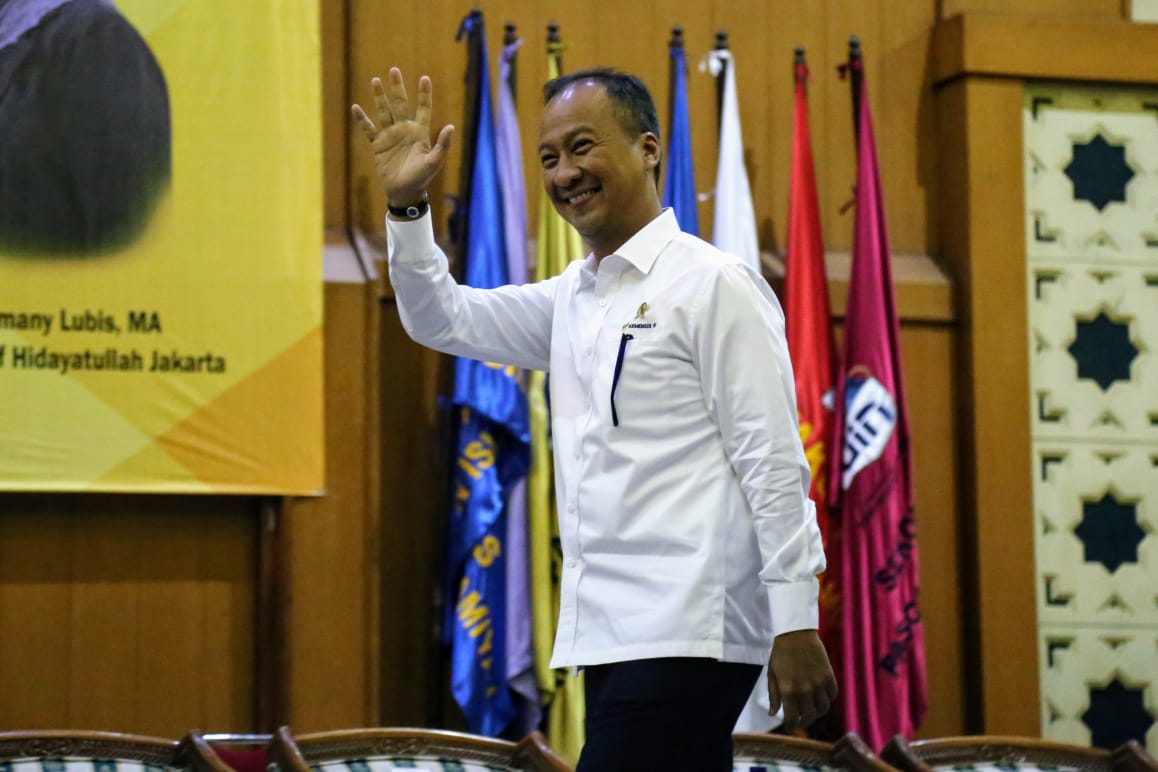JAKARTA (July 22, 2019) - Minister of Social Affairs Agus Gumiwang Kartasasmita said that almost all social welfare development policies initiated by the Ministry of Social Affairs emphasize the importance of opening wide spaces for community involvement.
The inclusiveness aspect of the Ministry of Social Affairs program is aimed at opening up access and empowering marginalized groups.
"The development of social welfare is focused on touching socially excluded people (including economically) by providing social welfare services," said the Minister, at the 2019 Community Service Participant Release Ceremony (UIN) Syarif Hidayatullah State University, Jakarta, Monday (22 / 07/2019).
In front of more than 3000 students, the Minister stated, the excluded groups who were the subject of social welfare development policies included the poor, physically or mentally disabled people, elderly, neglected children and children in conflict with the law, victims of drug abuse, ex-terrorist prisoners, and other which requires social welfare services.
To the students and academic community of UIN Syarif Hidayatullah, the Minister explained a number of steps the Ministry of Social Affairs had to reach out and restore social functioning to the marginalized group.
First, in handling poverty, all poverty reduction policies are carried out in accordance with the Integrated Poverty Database managed by the Ministry of Social Affairs.
"Integrated Poverty Database includes a group of 40 percent of the lowest strata (the poorest) people who were proposed by the community through deliberations (village deliberation / village meeting). "Village deliberation / village meeting is not only consultative but has a strategic position in the decision-making process," the Minister emphasized.
Second, in the form of the Family Hope Program to improve living standards through access to education, health and social welfare services and encourage changes in behavior and independence among the poor. "Here the community is the subject of empowerment, while the government only facilitates and provides assistance," he said.
Third, the social assistance in the form of subsidized rice program (Rastra) / Non-Cash Food Aid (BPNT). "This program is the government's effort to reduce poverty by reducing the expense of the poor through meeting basic food needs," said the Minister.
The design of the BPNT program is also directed to improve financial inclusion and encouraging the growth of micro businesses in the food sector in the form of e-warong.
Fourth, Productive Economic Endeavors (UEP) assistance for the poor individual or joint business group (KUBE). "UEP-KUBE is intended to increase the income of the poor through productive economic endeavors and build social relations harmony between citizens," he said.
KUBE-UEP is intended to strengthen economic empowerment by creating micro businesses for the poor. Because, the low level of education among the poor creates a vicious cycle of poverty due to the low ability to compete in the labor market. "Therefore, empowerment interventions are needed by creating micro businesses," the Minister emphasized.
Fifth, the growth of the layers of the elderly is a significant challenge for national development. The number of elderly people in Indonesia is currently at 24.4 million people or 9.27 percent of the total population, with a growth trend that continues to increase and is predicted to reach 11.3 percent in 2020.
"Because, elderly people are vulnerable to fall into poverty, abandonment and other social welfare problems due to declining levels of income, productivity, health, and the ability to socialize," he said.
The Minister of Social Affairs said, the social rehabilitation model of the elderly group was done by prioritizing the role of the community in the family. To encourage the creation of an inclusive environment for the elderly, said the Minister, the Ministry of Social Affairs has issued a regulation through Permensos (Indonesian Ministry of Social Affairs regulations) No. 4 of 2017 concerning Guidelines for the Development of Elderly-Friendly Areas.
No less important is social rehabilitation services for people with disabilities. Quoting National Socio-Economic Survey in 2018, Minister of Social Affairs said, around 9% -12% of Indonesia's population or around 30 million people are people with moderate and severe disabilities.
"The Ministry of Social Affairs is strengthening social protection schemes for people with disabilities through social assistance (such as The Family Hope Program (PKH), Non-Cash Assistance Program (BPNT), Smart Indonesian Program (PIP), Social Assistance for People/Persons with Disabilities (ASPDB) and Neglected Elderly Social Assistance (Aslut)), strengthening social assistance, and strengthening community-based social services for people with disabilities," said the Minister.
"Social welfare development launched by the Ministry of Social Affairs, said the Minister, cannot be separated from the vision of inclusive development also reflected in an increase in the social protection budget," said the Minister.
The government still maintains a vision of inclusiveness even in the midst of a global economic slowdown and a tight budget posture. Minister of Social Affairs, the social protection budget increased from IDR249.7 trillion in 2015 to IDR274.7 trillion in 2017 and IDR387.3 trillion in 2019.
"The social protection budget is focused specifically for 40% of the lowest strata of society through various program schemes including PKH, Food Aid, JKN / PBI, Village Funds, PIP, Bidik Misi (a state sponsored scholarship program), and subsidies outside of tax subsidies," said the Minister.
Head of the Public Relations Bureau Ministry of Social Affairs RI
Sonny W. Manalu
 Bahasa
Bahasa
 English
English


